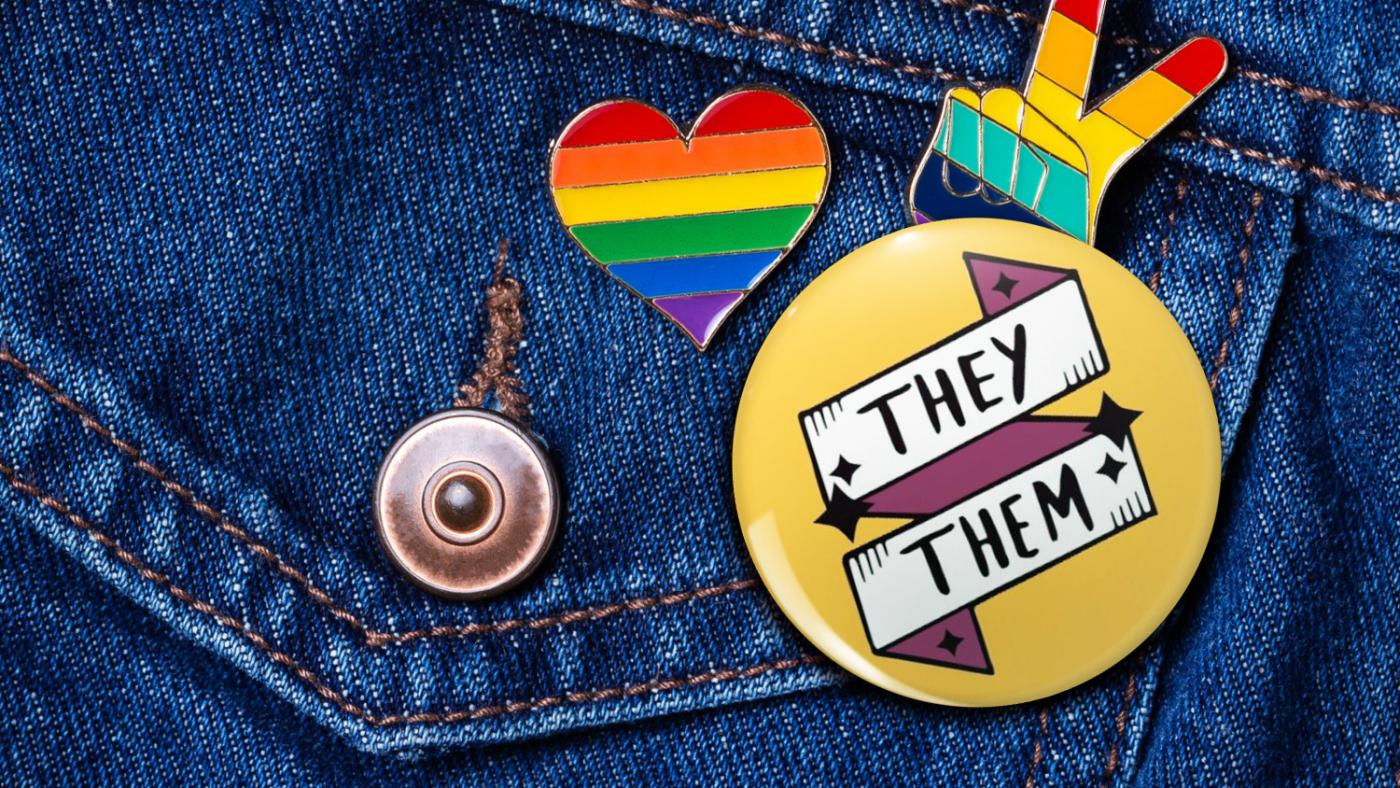Pronouns and gender registration
‘It is about time we get a place to talk,’ say transgender and non-binary students

Frustrations related to toilets, pronouns and sex registration are among the main reasons that led Lune de Rijck, a student in Politics, Philosophy & Economics, to run for the University Council. Lune, who identifies as non-binary, is one of the students being consulted by the Equality, Diversity & Inclusion Office (EDI) in a series of talks that will inform the upcoming report. There is going to be at least one meeting a month until the end of the academic year, according to the student.
“Most of my problems are related to teachers,” they say. Lune usually sends an e-mail upfront to inform teachers of their preferred pronouns but, unfortunately, “many of them weren’t respectful of that. They were either confused by my pronouns or didn’t want to use them.” When a teacher keeps misgendering Lune despite the e-mail and being corrected, the student turns to their mentor for help. “But I know other gender-queer people can’t always bring themselves to do that.”
Lune is not the only student at UU who’s had at least one teacher refer to them with the wrong pronouns, despite having been informed of the correct ones, in some cases repeatedly. “It happens all the time and it really sucks,” says Aidan Macleod, a transgender man pursuing a Master’s in Development and Socialisation in Childhood and Adolescence. “If people misgender you because they don’t know, that’s one thing. But when they do know and just keep doing it, it feels like they don’t care, like they’re not even trying.” Aidan acknowledges that most mistakes are due to “forgetfulness, habits and the way we categorise the world” and observes that there’s usually “no malintent”. However, “when it happens again and again and again, you start wondering: ‘is there really no malintent? I told you several times.’”
Aidan says that being continually misgendered by teachers is a distraction; a constant reminder that he is different while he doesn’t necessarily want to think about that in class. “I am trying to learn.” Willem Vos, a non-binary Master’s student in Art History, agrees and underscores that being misgendered “is deeply emotional because there are so many things connected to it”. Bachelor’s student Max*, also non-binary, explains it further: “It’s not just about feeling iffy when somebody gets your pronouns wrong. It’s being reminded that I haven’t spoken to my brother in a year because of this. If I’m having a bad day, being misgendered can trigger so many other things.” Things that can affect their wellbeing, concentration and academic performance.

Lune De Rijck, member of the University Council in 2022-2023. Photo: Utrecht University
Walking on eggshells
Another issue mentioned by the four students is how some teachers seem to walk on eggshells when they have a student who is not cisgender in their course (a cisgender person is someone whose gender corresponds to the sex registered for them at birth – Ed.). They just don’t know how to ask somebody’s preferred pronouns. One of Aidan’s teachers waited to hear how other students referred to him and then just went along with the pronoun they used. Although the intentions were good, “in this case your gender becomes assumed, which is problematic,” says Aidan. “My classmates might not know the truth. During the first two weeks of classes, I didn’t say anything. It was only two or three weeks in that I sent a message in our group chat.”
Aidan’s most unpleasant experience was when a teacher took advantage of a day he didn’t come to class to ask classmates which pronouns to use to refer to him. “When I heard about that, I was like: ‘why didn’t you ask me?’ Later on, I learned that this teacher was also saying transphobic things behind my back, which was really hurtful.”
Luckily, it looks like there are teachers interested in doing better. In October, Max and Willem gave a workshop on pronouns at a symposium organised by the Centre of Academic Teaching and the EDI Office, alongside Gender Studies teacher Domitilla Olivieri. They were surprised at how much teachers were eager to talk about the subject. “At least the ones who came to the workshop were not defensive. If anything, they were a bit helpless. They had no idea,” says Olivieri, interviewed by DUB alongside Max and Willem.
‘Not assuming things is a good place to start’
So, how should teachers approach pronouns? For starters, all four students say that the most important thing is not assuming somebody’s gender based on the way they look. Olivieri explains: “There are a thousand reasons not to do that. Sometimes cisgender people are misgendered as well because they don’t conform to a certain idea of what their gender should look like. Or sometimes people assume somebody’s nationality or race just based on how they look. Not assuming things is a good place to start.”
As for the best way to ask people what their preferred pronouns are, DUB started by asking the students what they think about teachers who organise a round of introductions, pronouns included, on the first day. Willem is on the fence: “It shouldn’t be mandatory to share your pronouns as it can out students who are not ready to do that yet.” Lune has some reservations as well. In their ideal world, teachers would state their own pronouns first and then invite students to share theirs if – and only if – they feel comfortable doing so. Aidan doesn’t mind such a round. “That way, the initiative isn’t on me to figure out when to say it and it’s not so othering because I’m not the only one who is saying it”.
Aidan’s best experience was when a teacher approached him after class to ask how best to address him. “That was really nice, although it was a little bit othering because I was the only student who was approached.” Max felt really good when a teacher corrected himself and then said “I’m sorry, I’m going to try to do better next time” during the break. Just be careful not to apologise too profusely. Aidan: “That makes it even worse because it becomes such a big deal. OK, you slipped up, just excuse yourself and carry on. You don’t have to spend an entire minute beating yourself up and then I am in the awkward position of having to comfort you instead.”
Until teachers know students’ gender, it’s nice to try to use neutral language, the students say. The recently-launched Inclusive Teaching Toolbox can be of help. “I think addressing everyone the same way is super respectful,” ponders Lune. “Gender-neutrality does not take away gender, it just makes everyone who is not gendered more comfortable.”
At least in English, using neutral language isn’t that hard to do. Dutch, however, is a different story. “Dutch is an inherently gendered language, so it’s going to be really difficult to make it neutral. What I’m doing most of the time is talking about the grammar aspects of non-gendered language in Dutch,” says Willem. Lune confirms: “Dutch students and staff are different when it comes to accepting neutral pronouns, compared to their international counterparts. They often refer to neutral pronouns as being ‘bad grammar.’” The solution, according to both, is to keep talking openly and respectfully about the topic.

The Art History student Willem Vos. Photo: courtesy of the student.
‘Education is key’
Speaking of conversations, the students – and Olivieri – are unanimous in stressing the importance of educating teachers about gender identity. In their view, the university should not impose any rules without setting up some sort of training session for teachers first. Willem: “The thing about policy is that, if you don’t have a conversation about it first, you risk stigmatising things even further. People will say ‘oh no, now I’m forced to do this’ because they don’t really understand it.”
“By starting this conversation, people will have thought about it at least once”, adds Max. But it is important to keep the conversation going, as a first contact can arouse both positive and negative reactions, notes Olivieri. On the one hand, more people are aware nowadays of what the words transgender and non-binary mean but, on the other hand, the increased visibility generates resistance.
According to the teacher, resistance can take up three forms: first, arguing that many people need to do hard work for a handful of people; secondly, not wanting to question something that’s always been taken for granted (namely, the binary male/female); and lastly, defining gender as an exclusively left-wing domain. “It’s this idea that the university should leave any discussion about gender identity aside because it is supposed to be above political opinions. But it’s not true that the only people whose gender matters to them are left-wing,” says Olivieri.
The three ways of resistance mentioned by the teacher came up again and again in the answers given by UU students and staff in the diversity survey conducted by higher education media (before it was sabotaged by GeenStijl). “This only matters to a marginal group. It’s strange that so much money is being spent on this while there are entire groups that can't even make it to university,” says a Dutch student. “I would be weirded out if the first class started with a round asking everybody’s pronouns. I’d get the feeling that I’m forced to participate,” states another student. “We’re all human and that’s what matters, I don’t think it’s important to put a ‘diverse’ label on people,” remarks an employee.
Max and Olivieri emphasise that sex and gender are two different things. Sex is a biological characteristic while gender is in the mind: it’s about the ideas surrounding masculinity and femininity. “Our society is so intrinsically gendered at so many levels and many people don’t even realise it! For example, people throw gender reveal parties for their babies – which should be called genital reveal parties – because they care so much about someone’s sex and assume things about their personality before they’re even born,” argues Max.
Lune acknowledges that, as a non-binary person, they’re part of a very small minority. “I know the world does not revolve around my gender identity. Not everything should be changed just because I’m here”. But, in the student’s view, more and more people are becoming comfortable with having a different gender identity now. “Women also used to be a minority in the university. I am now a minority but I might not be in the future. To make people as comfortable as possible, I think we should look into all of this right now.”
“It’s not like we want special attention, we just haven’t been getting any attention at all for too long,” declares Max.

In October 2021, the world's longest rainbow-coloured bike path was inaugurated in the Utrecht Science Park. Photo: Isabela Hesselink
Gender registration
Transgender and non-binary students are often misgendered on paper, too. Currently, they may change the first name on their e-mail addresses but official communication and documents (such as diplomas) refer to them according to their sex as registered by the municipality, which may or may not match the student’s gender.
The modification of registration systems is a hot topic in almost all higher education institutions in the Netherlands. At Erasmus University Rotterdam, efforts were successful and students are now able to change their pronouns in the education software.
It remains to be seen what UU will do in this regard. Meanwhile, students keep being misgendered. Willem just had such an experience with a document that is going to the university’s archives, which they define as “quite hurtful.”
Lune says they would like to see a system where students would insert their preferred pronouns when applying to UU. Once admitted, they would be able to change the pronouns throughout their entire studies. That way, transgender and non-binary students wouldn’t need to send an e-mail upfront like Lune does. “But I’ve spoken to the EDI Office and things are sometimes a bit more complicated to implement than I assume.”
Lune appreciates the efforts nevertheless. After the first few meetings, the student thinks that the EDI Office is going in the right direction. “I have a lot of faith in what we can achieve,” they say with a smile on their face. “I’m grateful that I can talk about my experiences and that they’re really listening. That makes me happy. It is about time we get a place to talk.”
*Max prefers not to reveal their last name and study programme. Both are known by DUB's editors.